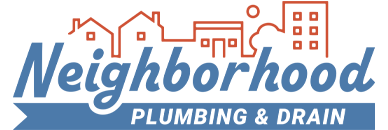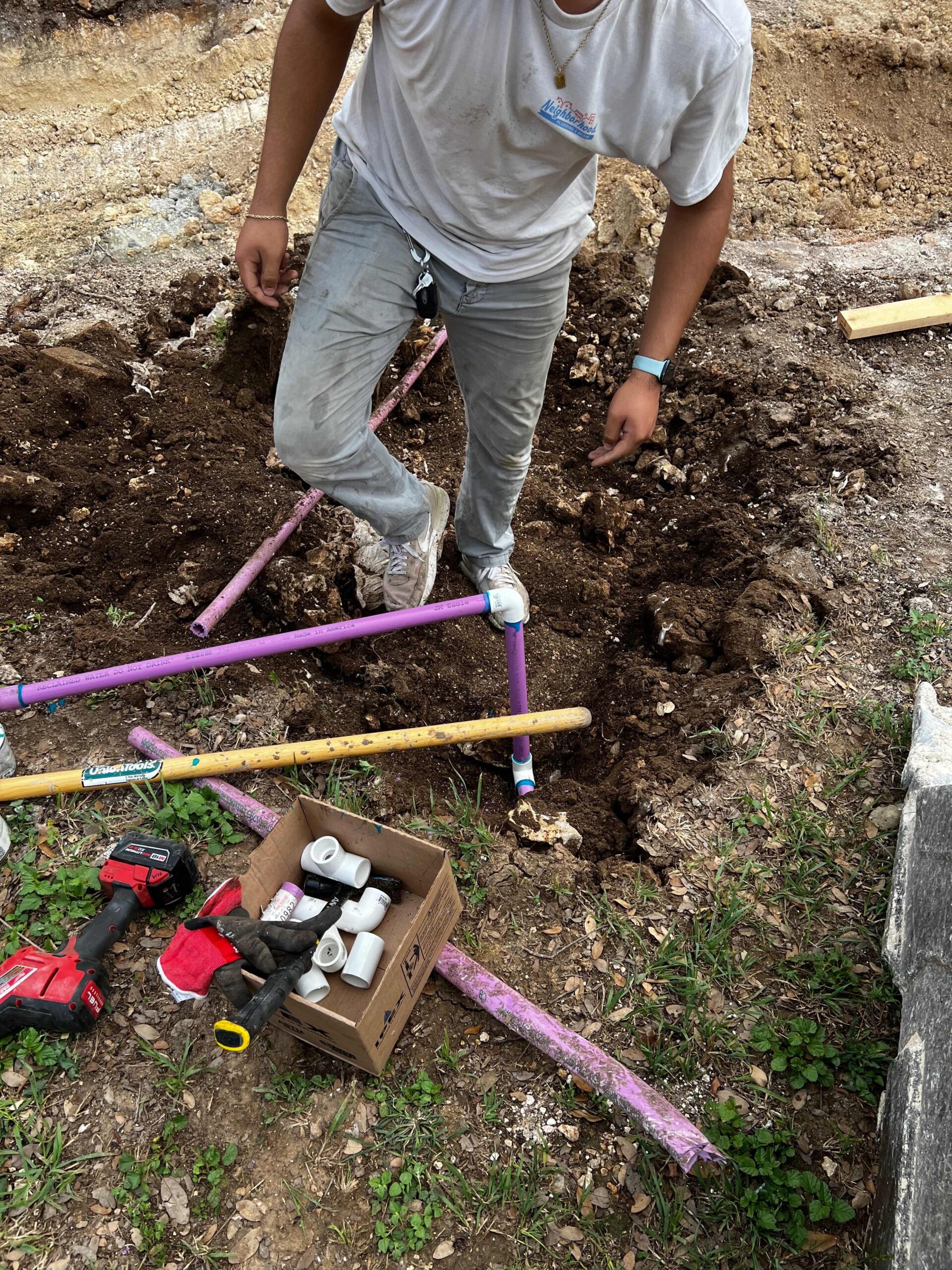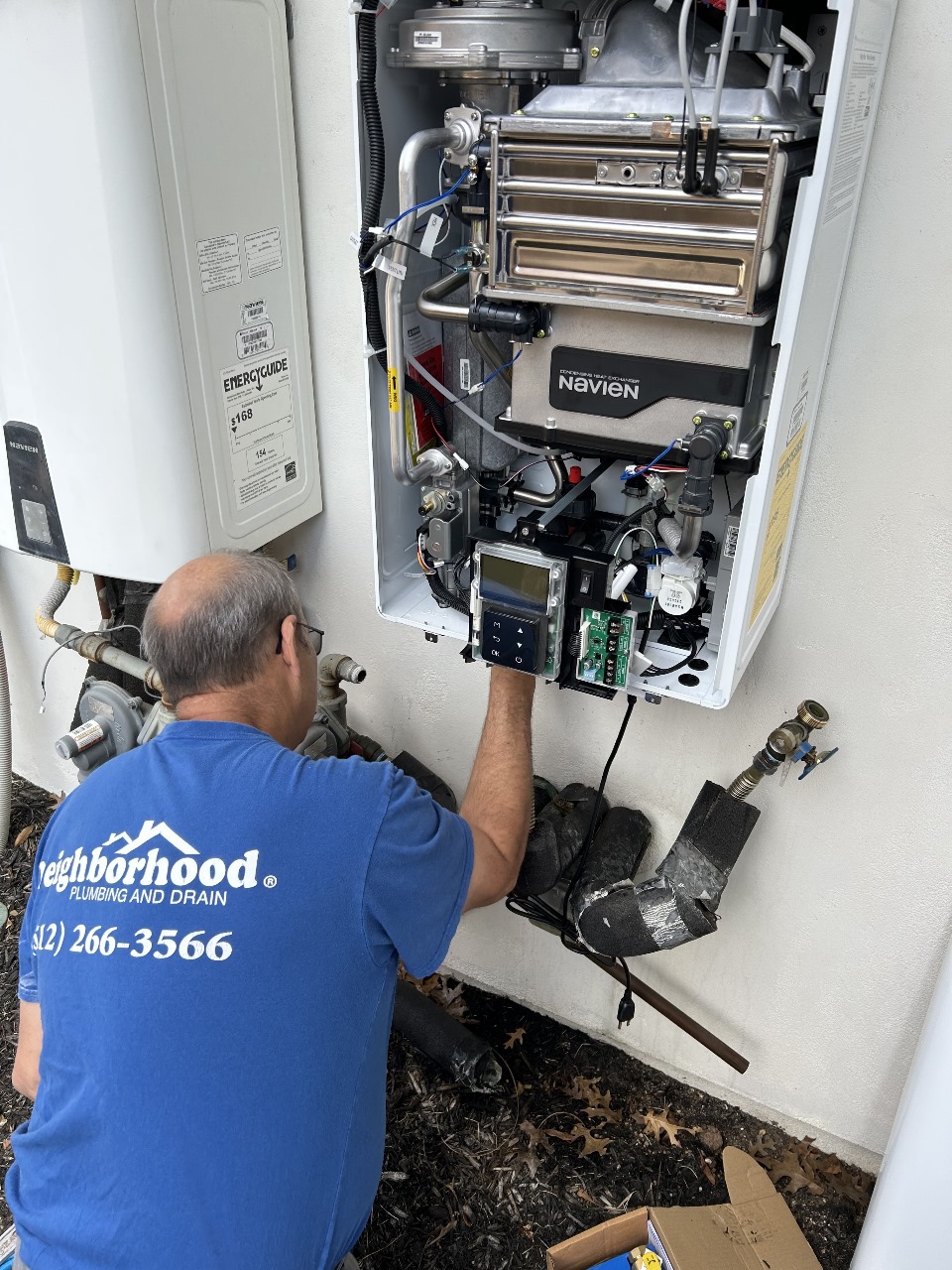Common Problems with Tankless Water Heaters and When Replacement Is Necessary
Tankless water heaters have become increasingly popular due to their energy efficiency and on-demand hot water supply. However, like any appliance, they can experience issues over time. Understanding common problems with tankless water heaters and knowing when a replacement is necessary can help Lakeway homeowners maintain their hot water supply and ensure their system operates efficiently. This guide from Neighborhood Plumbing and Drain covers everything you need to know about tankless water heater replacement in Lakeway.
Common Problems with Tankless Water Heaters
- Mineral Buildup
One of the most common issues with tankless water heaters is mineral buildup. Hard water contains minerals like calcium and magnesium, which can accumulate inside the heater over time. This buildup can reduce efficiency, cause the unit to overheat, and even lead to damage.
Solution: Regular maintenance, including descaling, can help prevent mineral buildup. Installing a water softener can also reduce the amount of minerals entering your system.
- System Overload
Tankless water heaters are designed to provide a continuous supply of hot water. However, if multiple outlets demand hot water simultaneously, the system can become overloaded and fail to deliver adequate hot water.
Solution: Ensure your tankless water heater is appropriately sized for your household’s needs. In some cases, adding a second unit may be necessary to meet high demand.
- Ignition Failure
Tankless water heaters rely on ignition to heat water. Issues with the ignition system can prevent the heater from operating, resulting in no hot water.
Solution: Check for gas supply issues, and ensure there are no blockages in the venting system. Regular maintenance can help identify and resolve ignition problems before they become severe.
- Error Codes
Modern tankless water heaters are equipped with diagnostic systems that display error codes when something goes wrong. These codes can indicate a range of issues, from minor glitches to serious problems.
Solution: Refer to your unit’s manual to understand the error codes and address them accordingly. If you’re unsure how to resolve the issue, contact a professional plumber for assistance.
When Is Replacement Necessary?
While many issues with tankless water heaters can be resolved through maintenance and repairs, there are situations where replacement is the best option. Here are some signs that it may be time for a tankless water heater replacement in Lakeway:
- Age of the Unit
The lifespan of a tankless water heater is typically around 6 to 12 years. If your unit is approaching or exceeding this age, it may be time to consider a replacement, even if it seems to be working fine. Older units are less efficient and more prone to breakdowns.
- Frequent Repairs
If you find yourself frequently calling for repairs, it may be more cost-effective to replace the unit. Continual repairs can add up quickly, and a new unit will be more reliable and efficient.
- Decreased Efficiency
Over time, tankless water heaters can become less efficient due to wear and tear. If you notice a significant increase in your energy bills or the unit is no longer providing consistent hot water, it may be time for a replacement.
- Persistent Issues
Certain issues, such as persistent leaks or significant mineral buildup, may indicate that the unit is beyond repair. In these cases, replacing the unit is often the best solution.
- Advancements in Technology
Newer models of tankless water heaters are more efficient and come with advanced features that can improve performance and convenience. Upgrading to a newer model can provide better energy savings and enhanced functionality.
Benefits of Tankless Water Heater Replacement
Replacing an old or malfunctioning tankless water heater offers several benefits:
- Improved Efficiency
Newer tankless water heaters are designed to be more energy-efficient, which can lead to lower utility bills. They use advanced technology to heat water more effectively and reduce wasted energy.
- Increased Reliability
A new unit is less likely to experience breakdowns and issues, providing you with a more reliable hot water supply. This reliability is particularly important in larger households with high hot water demands.
- Enhanced Performance
Modern tankless water heaters offer better performance, including faster heating times and more consistent water temperatures. This means you can enjoy hot water whenever you need it without worrying about interruptions.
- Space Saving
Tankless water heaters are compact and can be installed in smaller spaces compared to traditional tank water heaters. This can free up valuable space in your home for other uses.
- Environmental Benefits
By using less energy to heat water, tankless water heaters have a smaller carbon footprint. Upgrading to a more efficient unit contributes to a more sustainable lifestyle.
Choosing the Right Tankless Water Heater Replacement in Lakeway
When it comes to selecting a new tankless water heater, consider the following factors to ensure you choose the right unit for your needs:
- Size and Capacity
Make sure the tankless water heater is appropriately sized for your household’s hot water demand. Consider the number of occupants, bathrooms, and water-using appliances.
- Energy Efficiency
Look for units with high energy efficiency ratings. ENERGY STAR-rated models are a good choice as they meet strict efficiency standards and can save you money on utility bills.
- Fuel Type
Tankless water heaters can be powered by gas, electricity, or propane. Choose the fuel type that is most convenient and cost-effective for your home.
- Features
Modern tankless water heaters come with various features such as Wi-Fi connectivity, recirculation pumps, and advanced control systems. Consider which features are important for your household.
- Professional Installation
Proper installation is crucial for the efficient operation of a tankless water heater. Hire a professional plumbing service in Lakeway to ensure the unit is installed correctly and safely.
Why Choose Neighborhood Plumbing and Drain for Your Tankless Water Heater Replacement?
Neighborhood Plumbing and Drain is Lakeway’s trusted provider of plumbing services, including tankless water heater replacement. Here’s why you should choose us:
- Expertise and Experience
Our team of skilled plumbers has extensive experience in installing and maintaining tankless water heaters. We can help you choose the right unit and ensure it is installed to the highest standards.
- Quality Service
We are committed to providing top-quality service to our customers. From the initial consultation to the final installation, we ensure a seamless and hassle-free experience.
- Comprehensive Solutions
We offer a wide range of plumbing services, including maintenance and repairs, to keep your plumbing system in optimal condition. Our preventative maintenance plans help extend the life of your tankless water heater.
- Customer Satisfaction
Customer satisfaction is our top priority. We take the time to understand your needs and provide personalized solutions that meet your specific requirements.
Conclusion
Understanding common problems with tankless water heaters and knowing when a replacement is necessary can help Lakeway homeowners maintain a reliable hot water supply. Regular maintenance and timely replacements ensure your system operates efficiently, providing you with consistent hot water and energy savings.
For all your tankless water heater replacement needs in Lakeway, trust Neighborhood Plumbing and Drain. Our experienced team, quality service, and commitment to customer satisfaction make us the top choice for homeowners looking to upgrade their water heating systems.
Contact us today to schedule a consultation and ensure your home’s hot water needs are met with the best solutions available. Call us at 512-266-3566 today!






